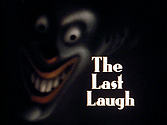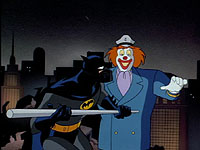|
||
|
| Credits | Cast | |
Written by Carl Swenson Directed by Kevin Altieri Music by Shirley Walker Animation by Akom |
Kevin Conroy as Bruce Wayne Efrem Zimbalist, Jr. as Alfred Richard Moll as Computer |
Mari Devon as Summer Gleeson Mark Hamill as The Joker Pat Fraley as Jest |
|
I'm sure that "The Last Laugh" was not made in a spirit of experimentation, but that's the only charitable way of looking at it. The episode has the kind of inane Joker plot that would strike a clever but limited TV writer as "typically comic book": the Joker floods the Gotham financial district with laughing gas and starts cleaning the place out; Batman stops him. It also has characters making asides to the audience, whether it is vaguely in character (the Joker) or not (Alfred), and tiresome little "comic" touches like Batman glaring at the Joker through a periscope before slugging said periscope. But it also plays for melodrama: prolonged exposure to the gas will cause permanent insanity, a plot point that is helpfully and redundantly repeated when Alfred gets a snootful and then dropped altogether. And the bulk of the story is padded out with fight scenes that are extended, grim, and inefficient—testament to the way the story has defeated director Kevin Altieri, whose action scenes are usually lyrical expositions of space and movement. (Credit where credit is due, though: there is a remarkably vicious beating visited upon a robotic clown goon.) Nor has the episode the uneasy, dream-like atmosphere of "Critters," where the mix of the comic and the melodramatic becomes a challenge to one's sense of reality. Instead, it just feels like a cynical attempt to give the audience what the audience presumably wants—Batman in action and the Joker in stitches—as though the audience hadn't long ago seen through and moved beyond that kind of stuff. Even Shirley Walker's score sounds retro, though that turns out to be not such a bad thing. It has an odd, seventies' police show "wackatta wackatta" kind of vibe to it—an intriguing choice, even if it sounds like it should belong with a different (and better) episode—maybe in something starring Bullock. This was a pretty early episode in the production cycle, so it's understandable that it should have such an uncertain tone. As such, there's a kind of archaeological interest in discovering a story that stands semi-erect as an evolutionary "missing link": something between the primitivism of Superfriends and the fully realized series that we eventually got. And it's useful to have a reminder of what BTAS could have been: a show that played up the "cartoon" in "cartoon action show." But that's special pleading. A final note, since I see no point in prolonging the agony. I don't care if it is April Fool's Day: Bruce Wayne shouldn't laugh here, and he certainly shouldn't be making jokes at the expense of a deeply discomfited Alfred. |
|
Production Notes Kevin Altieri on changes to the script: "Other than dialogue, what you see on screen doesn't really resemble the script at all. In the original, Batman kept getting garbage dumped on him." Bruce Timm on Captain Clown: "We found out that we could beat the crap ot of him, because he's a robot. It was great. We didn't know if we could get away with that, but we took a chance ... and there was no objection." |
|
Related Episodes |
What Others Are Saying ... |
| Back to Joker's Wild |
Forward to The Laughing Fish |


